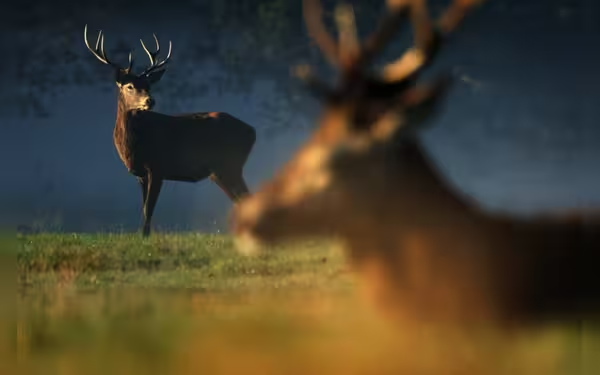Saturday, November 16, 2024 11:19 PM
Sustainable Deer Management in England: Addressing Overpopulation and Food Insecurity
- Deer overpopulation threatens ecosystems and agriculture.
- Culling provides sustainable protein source for food banks.
- Venison awareness is growing in the UK market.
 Image Credits: thefrontierpost
Image Credits: thefrontierpostEngland faces wild deer overpopulation, prompting humane culling for ecological balance and food support.
In recent years, the issue of wild deer overpopulation has become a pressing concern in England. With the deer population reaching its highest levels in over a millennium, the balance of local ecosystems is at risk. This situation has prompted discussions about humane deer management, which involves culling deer to control their numbers and protect forests and farmland. The absence of natural predators in the region has led to a significant increase in deer numbers, resulting in detrimental effects on the environment and agriculture.
Martin Edwards, a deer stalker and advocate for humane deer management, emphasizes the necessity of culling. He notes that excessive deer foraging damages young trees and the habitats of various bird species, such as robins. Farmers have reported substantial crop losses due to the overpopulation of deer, which also leads to starvation and disease among the animals themselves. Edwards points out that when deer populations are too high, they consume all the vegetation up to a certain height, leaving the ecosystem in a precarious state.
Forestry experts and businesses argue that culling deer not only helps restore ecological balance but also provides a sustainable source of low-fat protein. Venison, which is similar to lean beef but has a unique flavor, is often viewed as a luxury food item in the U.K. However, organizations like The Country Food Trust are working to change this perception by distributing meals made with wild venison to food banks. SJ Hunt, the charity's chief executive, poses a compelling question: "Why not utilize that fantastic meat to feed people in need?" This initiative highlights the potential of venison as an affordable protein source for those facing food insecurity.
The government acknowledges the role of native wild deer in healthy forest ecosystems but recognizes the need for population management. While funding is available for solutions like deer fencing, experts like Edwards argue that lethal control remains the most effective method, especially following the surge in deer populations during the COVID-19 pandemic. With hunters staying home and the restaurant market collapsing, deer had an opportunity to breed unchecked.
Ben Rigby, a wholesaler of venison and game meats, notes that his company now processes hundreds of deer each week. He emphasizes the importance of increasing the domestic appetite for venison, particularly after Brexit created new challenges for exporting the meat. "We’re not really a game-eating nation, unlike in France, Germany, or Scandinavia," Rigby explains, but he believes that awareness of venison is growing in the U.K.
In England, shooting deer is legal but strictly regulated. Stalkers must possess a license, use specific firearms, and adhere to open seasons. They also require valid reasons for culling, such as land damage caused by deer. Hunting with packs of dogs is prohibited. Making wild venison more accessible in supermarkets could encourage more stalkers to cull deer, ensuring that the meat does not go to waste.
Forestry England has taken steps to promote the use of wild venison, supplying hospitals with large quantities of the meat for meals enjoyed by patients and staff. While this initiative has received positive feedback, it has also faced criticism from animal welfare groups like PETA, which advocate for veganism. Nevertheless, Hunt believes there is significant potential to expand the use of venison, describing it as nutritious and "free-range to the purest form of that definition." Last year, her charity distributed hundreds of thousands of venison Bolognese meals to food banks, and the demand continues to grow.
The management of wild deer populations in England presents both challenges and opportunities. By addressing overpopulation through humane culling and utilizing the meat to support those in need, there is a chance to create a sustainable solution that benefits both the environment and the community. As awareness of venison increases, it may pave the way for a more balanced ecosystem and a healthier society.













